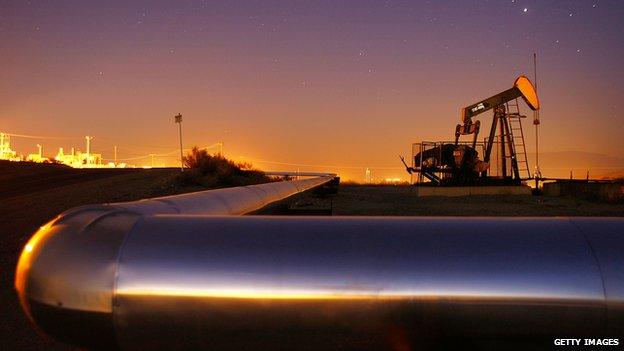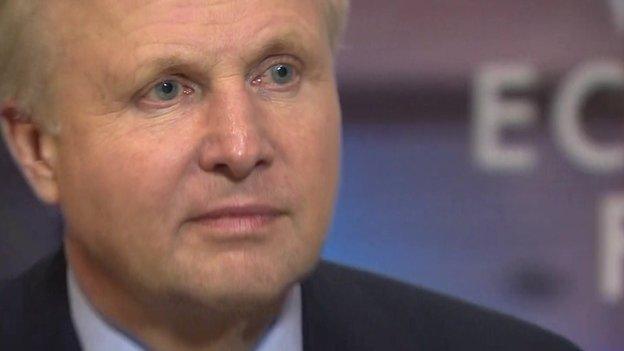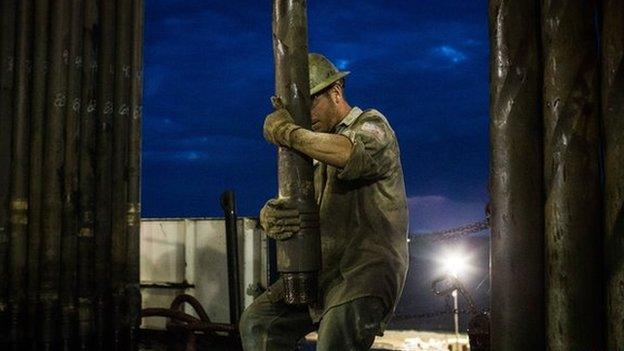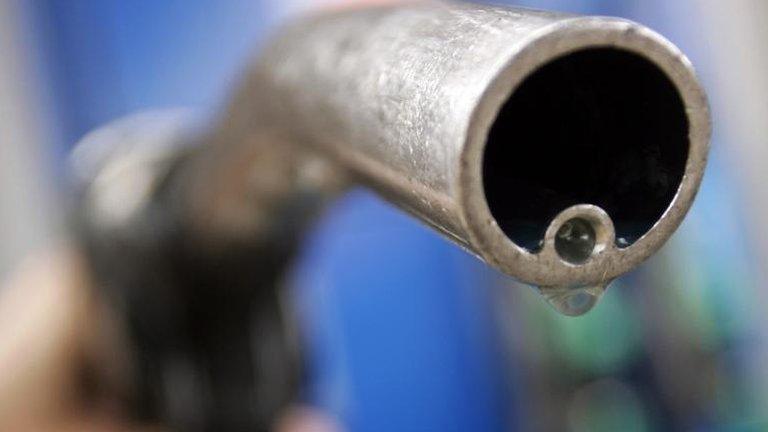BP boss Bob Dudley: Oil prices 'low for up to 3 years'
- Published

BP is planning for low oil prices for years to come
The boss of oil giant BP Bob Dudley has said that oil prices could remain low for up to three years.
He added that could send UK petrol prices below £1 per litre.
He told BBC Business editor Kamal Ahmed in Davos BP was planning for low oil prices for years to come.
That is expected to lead to job losses and falling investment in the North Sea oil industry and elsewhere, curbing supply and eventually forcing the price back up.
Italian oil group Eni has said the next spike could be around $200 a barrel.
Eni's chief executive, Claudio Descalzi, said the oil industry would cut capital spending by 10-13% this year because of slumping prices.
He said that would create longer-term shortages and sharp price rises in four to five years' time, if the Opec cartel fails to cut supplies.
Mr Descalzi was speaking at the World Economic Forum in the Swiss resort of Davos.

UK petrol prices may fall below £1 per litre should oil prices remain low, Mr Dudley said.
£1 per litre
Mr Dudley said historically world oil prices have fluctuated, and sometimes have remained low for a number of years.
He expects to see current low prices for at least a year, and that BP has to plan for that.
"Companies like us, at BP, we're going to need to rebase the company based on no guarantees at all that the price will come back up," he said.
"We have go to plan on this [price] being down, and we don't know exactly what level, but certainly a year, I think probably two and maybe three years."
From 2010 until mid-2014, oil prices around the world were fairly stable, at around $110 a barrel.
However, since June prices have more than halved. Brent crude oil is around $48 a barrel, and US crude is around $47 a barrel.
Mr Dudley said lower oil prices could mean UK petrol could fall below £1 per litre. This kind of petrol price was "not far off", despite taxation forming a part of the fuel price.
"If prices keep going down, I'm sure you will [see £1 per litre]," he added.
North Sea job losses?
Sustained low oil prices are also likely to cause "stress" on oil producing countries such as Norway, Russia, Venezuela, Scotland, Nigeria and Angola, he said.
"All these countries are really going to feel it," he said. "I think Scotland is going to be under some stress because of these low oil prices," he said.
BP has two large projects in the North Sea, including the Clair field, external, which have had £8bn investment over ten years, he said.
"Their economics are challenged now with these new prices," he added. "But we're in the North Sea for the long term. We have a large workforce in Scotland. There will be activities that we needed to pare back anyway."
The fallout from "difficulties in the US" - referring to the fatal explosion at the Deep Water Horizon oil rig - were affecting the business, he said.
Globally, BP and the rest of the energy industry were likely to see "significant workforce reductions," he added.
Oil price worries
Italian oil group Eni chief Mr Descalzi called for Opec to cut production.
He said: "Opec is like the central bank for oil which must give stability to the oil prices to be able to invest in a regular way."
Politicians, economists and industry leaders in Davos have been voicing their worries over the impact of lower prices.
Total and BHP Billiton both said on Wednesday that they would cut back on shale oil projects.
People's Bank of China governor Zhou Xiaochuan said low oil prices could slow down China's development of renewable energy projects.
He said: "We worry a little bit that the price signal may give disincentive for new energy types to develop and could reduce investment in new non-fossil energy,"
But he added that lower prices would be good for the economy and job creation, because China was dependent on imported oil and gas.
Opec's decision
Opec secretary general Abdullah al-Badri, also speaking at Davos, defended the group's decision not to cut output.
He said: "Everyone tells us to cut. But I want to ask you, do we produce at higher cost or lower costs?
"Let's produce the lower cost oil first and then produce the higher cost,"
"We will go back to normal very soon," he said.
Oil prices have sunk by almost 60% since June to below $50 a barrel because of a large supply glut.
The price slide accelerated after Opec decided in November not to cut production.
- Published21 January 2015

- Published7 January 2015

- Published19 January 2015
